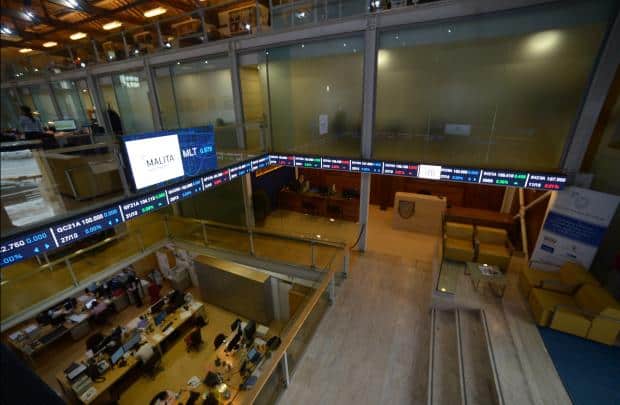The MSE Equity Price Index climbed 0.84% to 4,346.228 points as various equities ended the day in positive territory while only Mapfre Middlesea trended lower.
Meanwhile, trading in GO continued to dominate activity as it accounted for nearly 60% of the total value of equities traded. GO plc added 1.1% to recapture its 2018 high of €3.60 on activity totalling 84,501 shares.
Similarly, PG plc also moved to its 2018 high of €1.40 albeit on light volumes.
Malta International Airport plc advanced by 1.7% to regain its all-time high of €5.95 across 11,489 shares while two deals totalling 3,642 shares lifted the equity of HSBC Bank Malta plc 2.3% higher to the €1.75 level.
FIMBank plc added 2.6% to an over five-month high of $0.595 on a single deal of 21,000 shares.
In the property segment, Tigne’ Mall plc advanced 3.7% to the €0.99 level across 20,000 shares.
On the other hand, MIDI plc (3,000 shares) and Trident Estates plc (6,081 shares) closed flat at €0.57 and €1.34 respectively. Trident is due to publish its interim results on September 26.
Simonds Farsons Cisk plc also traded unchanged at the €7.10 level across 4,316 shares. On Wednesday afternoon, Farsons published its interim results as at July 31, 2018. The company reported growth across all of its business segments, helping net profits to rise by almost 7% to €6.11 million compared to €5.72 million in the first half of the previous financial year. The directors declared an unchanged net interim dividend of €0.0333 per share which is payable on October 10 to shareholders as at close of trading on September 24.
Bank of Valletta plc retained the €1.48 level across 46,951 shares while BOV’s insurance associate – Mapfre Middlesea plc – lost 0.5% to the €1.84 level on just 1,152 shares.
Tuesday’s rebound in the prices of Malta Government Stocks was short-lived as the RF MGS Index retreated by 0.12% to a four-year low of 1,085.985 points. Eurozone sovereign yields trended sharply higher, with the 10-year German Bund yield momentarily reaching a three-month high of just above 0.5%, as Tuesday’s escalation in the trade war between the US and China is now causing additional fear of higher global inflation in the months ahead. This could force major central banks, particularly the US Federal Reserve and the European Central Bank, to accelerate monetary policy tightening.

